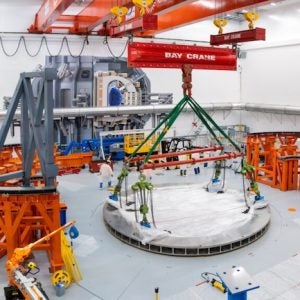Kazakhstan’s national atomic company Kazatomprom and Canada’s Cameco Corporation have signed an agreement to restructure their uranium mining Inkai joint venture (JV) in Southern Kazakhstan. "Considering both the near term uranium market challenges and the favourable investment climate in the Republic of Kazakhstan, Canadian corporation Cameco and Kazatomprom plan to extend their mutually beneficial cooperation until 2045," a Kazatomprom statement said on 27 May. The agreement defines further development of joint projects and, in particular, provides "for the extension of the contract for subsoil use, as well as increasing the share of Kazatomprom in JV Inkai from 40% to 60%".
It also stipulates terms and conditions for setting up a joint refinery. Cameco is ready to grant "a five-year option to license Cameco’s proprietary uranium conversion technology for purposes of constructing and operating a UF6 conversion facility in Kazakhstan as well as the option to obtain UF6 conversion services for Kazatomprom at Cameco’s Port Hope facility for a period of 10 years and receive other commercial support". A feasibility study will precede any construction decision.
Inkai, in southern Kazakhstan is operated by JV Inkai, which is currently owned 60% by Cameco and 40% by Kazatomprom. The new agreement replaces a memorandum of understanding signed in September 2012. It provides for annual production to be ramped up to 10.4m pounds U3O8 (4,000 tU) a year over three years, following the receipt of all required approvals. These include amendments to JV Inkai’s existing resource use contract that are expected to take 18-24 months to secure.
The two companies will complete a feasibility study to evaluate the design, construction and operation of a uranium refinery in Kazakhstan, capable of producing 6,000 tU a year as uranium trioxide. This would be owned 71.67% by Kazatomprom and 28.33% by Cameco, and Cameco’s interest in JV Inkai would increase to 42.5% on commissioning of the refinery. Cameco’s ownership in both the refinery and JV Inkai could increase to 29.33% and 44%, respectively, depending on the level of commercial support it provides.
Kazakhstan holds 12% of the world’s uranium resources and is the world’s leading uranium producer with an output of about 23,800 tU – 39% of world production – in 2015. It produced 6,000 tU between January to March and plans to increase output for the whole of 2016 to 24,080tU, up from 22,800tU last year. Kazakhstan energy minister Kanat Bozumbaev said on 25 May: "We are challenged to keep and control this niche through maintaining the leading positions and to continue building up a vertically integrated complex of nuclear fuel cycle."






